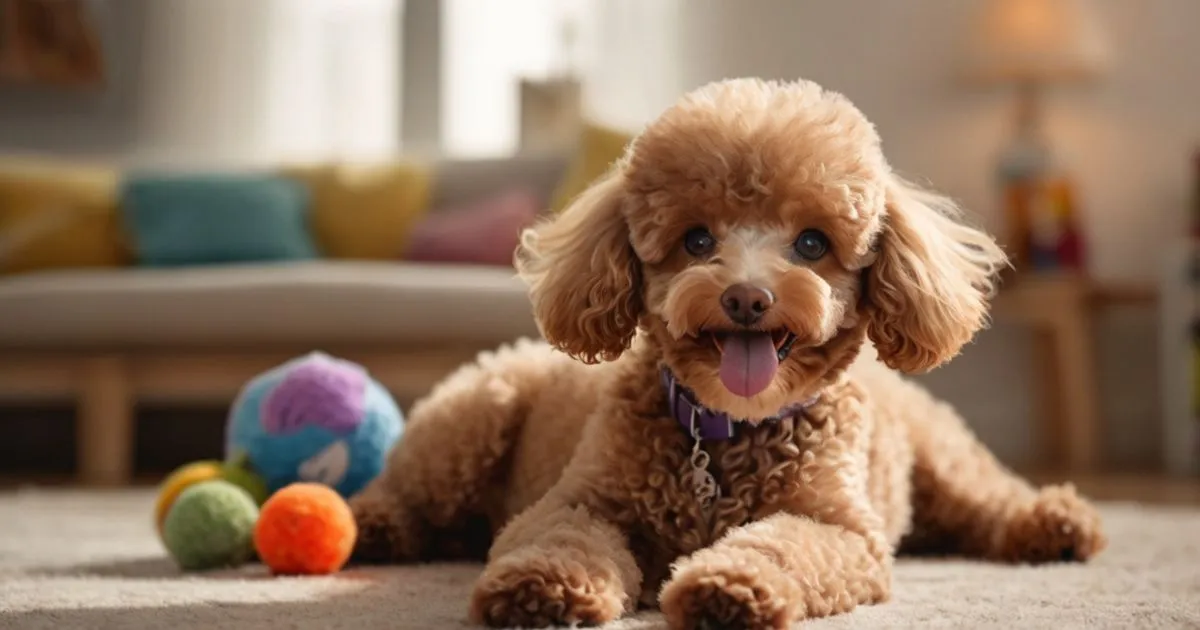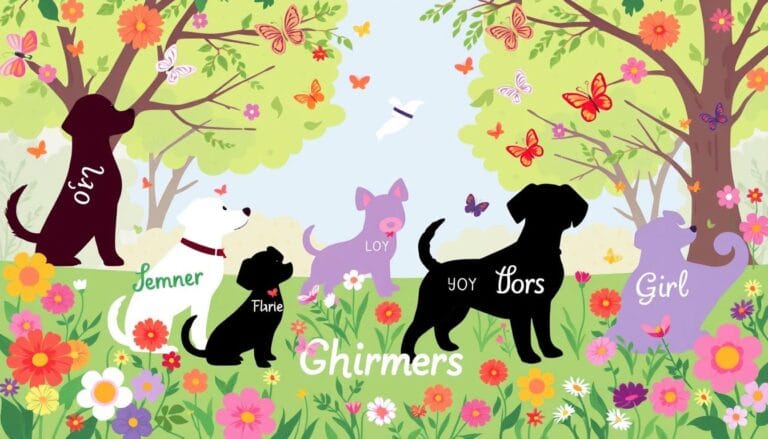Toy Poodle: A Perfect Small Dog for Your Family
As I look at my beloved Toy Poodle, Lola, by my side, I feel joy. These dogs bring so much happiness and companionship. Their smart eyes and playful nature win our hearts, making them a big part of our families.
Looking for a small, loving dog? The Toy Poodle is a great choice. They are smart, loving, and fit well in any home. They are perfect for families of all sizes.
Table of Contents
Key Takeaways
- Toy Poodles are intelligent, adaptable, and affectionate small dogs, ideal for families.
- They are hypoallergenic, making them suitable for allergy sufferers.
- Toy Poodles excel in obedience and agility competitions, demonstrating their physical and mental capabilities.
- These dogs form strong bonds with their owners and require mental stimulation to remain happy.
- Toy Poodles come in a variety of colors, providing diverse aesthetic choices.
Understanding the Toy Poodle Breed History and Origins
The Toy Poodle’s history goes back to the 18th century. It started as a smaller version of the Standard Poodle. These small poodles were loved for their smarts, trainability, and as great companions.
Evolution from Standard Poodles
Poodles were known for their tracking skills and alertness. They were used for hunting. Later, they were bred to get smaller, creating the Toy Poodle.
The Toy Poodle became a favorite among the nobility in France and Europe. They loved its small size, fancy look, and friendly nature.
Development as Companion Dogs
The Toy Poodle’s popularity grew, and it became a beloved pet. Its small size, low-shed coat, and loving nature made it perfect for homes and apartments. It was also easy to train, making it a great pet for families.
Recognition by Kennel Clubs
The American Kennel Club recognized the Toy Poodle in 1887. This made it a distinct breed from the Standard Poodle. It became a popular show dog, known for its looks and personality.
“Toy Poodles are known for their intelligence, trainability, and affectionate nature, making them cherished companions for families and individuals alike.”
Physical Characteristics and Size Specifications
Toy Poodles are small and adorable, known for their tiny size and special looks. They usually weigh 6-9 pounds and are only 10 inches tall. This makes them perfect for those who want a small dog.
These dogs have a square body and long legs, giving them a fancy look. Their curly coat can be styled in many ways, from simple to fancy. They come in many colors like black, brown, and white.
Their coat is also special because it sheds very little. This is great for people with allergies. Plus, their small size is perfect for living in small places like apartments.
| Trait | Specification |
|---|---|
| Height | 10 inches |
| Weight | 6-9 pounds |
| Coat Type | Curly, hypoallergenic |
| Coat Colors | Black, brown, cream, white, and more |
| Grooming Needs | Moderate, with regular brushing and trimming |
Toy Poodles are loved for their small size, hypoallergenic coat, and cute looks. They can bring happiness and friendship to any family.
The Intelligence and Personality of Toy Poodles
Toy Poodles are known for their smart minds and fun personalities. They are small, curly dogs that love to solve problems and learn new things. This makes them a joy to train and have around.
Problem-Solving Abilities
Poodles, including Toy Poodles, are among the smartest dog breeds. They are curious and can solve complex problems. They learn quickly when trained positively.
Training Capabilities
The training capabilities of Toy Poodles are top-notch. They are trainable breeds that love to learn and please. They do well in dog shows and agility trials, showing their skills and love for training.
Emotional Intelligence
Toy Poodles have a high level of emotional intelligence. They connect well with people and understand their feelings. They are loving, attentive, and great at being therapy dogs. They also help keep the peace in the home.
| Trait | Description |
|---|---|
| Intelligence | Toy Poodles are among the most intelligent breeds, ranking highly in problem-solving and trainability. |
| Personality | Toy Poodles are affectionate, eager to please, and possess remarkable emotional intelligence. |
| Training | These trainable breeds thrive on mental stimulation and respond well to positive reinforcement methods. |
Understanding the intelligence and personality of Toy Poodles helps owners see the special joys and challenges they bring. These trainable breeds are truly unique.
Health Considerations and Life Expectancy
If you’re thinking about getting a Toy Poodle, knowing about their health and lifespan is key. Toy Poodles can live up to 15-17 years, which is longer than most dogs. But, they might face some health problems that need careful attention.
Dental disease is a big issue for Toy Poodles, affecting up to 80% by age two. Keeping their teeth clean is vital to avoid dental problems. Heart disease is also common, with heart valve and DCM being major concerns. Regular vet visits can help manage these issues.
Toy Poodles can also get joint and eye diseases, disk problems, and metabolic issues like Cushing’s Disease and diabetes. Good breeding practices and genetic tests can lower these risks. Keeping them at a healthy weight, exercising them right, and feeding them well also helps.
Regular vet visits, preventive care, and a happy home are crucial for your Toy Poodle’s health and happiness. Knowing about their health needs lets you take steps to ensure they live a long, happy life.

Daily Exercise and Activity Requirements
Toy Poodles are full of energy and need daily exercise to stay healthy. They love a routine that keeps them active and mentally sharp.
Physical Exercise Needs
Even though they’re small, Toy Poodles are very active. They need about 40 minutes of exercise each day. This can include walks, playtime, and other fun activities.
Puppies need even more exercise. A good rule is 5 minutes of walk time for every month of their age.
Mental Stimulation Activities
Toy Poodles also need mental challenges to keep their minds active. Toys, puzzle games, and training sessions are great for them. They help keep their behavior balanced and satisfy their curiosity.
Recommended Exercise Duration
Toy Poodles should get a mix of physical and mental activities for 30 to 60 minutes daily. Breaking this into shorter sessions helps match their energy levels and avoid too much exercise.
| Poodle Size | Average Daily Exercise Duration |
|---|---|
| Standard Poodle | 50 minutes |
| Miniature Poodle | 50 minutes |
| Toy Poodle | 40 minutes |
By giving Toy Poodles a balanced routine, owners can help them stay happy and healthy. Regular mental challenges are key to their well-being.
Grooming and Maintenance Essentials
Toy Poodles have unique, curly coats that need careful grooming. To keep their coats non-shedding and hypoallergenic, regular grooming is key. They should get professional grooming or at-home clipping every 4-6 weeks to avoid matting and keep their coat looking great.
Poodle coats can be styled in many ways, from the classic show cut to a simple, short all-over clip. The grooming needs of your Toy Poodle will depend on the hairstyle you choose. But, they all need regular brushing, nail trimming, and ear cleaning. Despite their grooming needs, Toy Poodles are great for people with allergies because they shed very little.
- Grooming every 4-6 weeks to prevent matting
- Variety of hairstyles, from show cut to short clips
- Regular brushing, nail trimming, and ear cleaning
- Ideal for allergy sufferers due to minimal shedding
Getting professional grooming or learning how to groom at home can help meet your Toy Poodle’s grooming needs. With the right poodle haircuts, your Toy Poodle can look healthy and stylish. They will also be easy to care for.
“Proper grooming is essential for maintaining the health and appearance of a Toy Poodle’s coat. Regular visits to a professional groomer or learning effective at-home techniques can make a significant difference in the long-term care of your pup.”
Living with a Toy Poodle: Lifestyle Considerations
Toy Poodles are great companions for many living situations, including apartments. They are small and fit well in urban areas. But, they need attention to their social needs and sensitivity.
Apartment Living Suitability
Toy Poodles are perfect for apartment living. They are small and don’t shed much. With enough exercise and toys, they’re happy in small spaces.
Family Integration
Toy Poodles are good with families, but not with very young kids. They can get anxious in loud places. It’s important to socialize them well and watch them closely around kids.
Social Needs
Toy Poodles love to be around people. They get sad if left alone too long. Make sure they get lots of attention and playtime every day.
| Breed Characteristic | Toy Poodle | Standard Poodle |
|---|---|---|
| Height | Up to 25 cm | Over 38 cm |
| Weight | Up to 3 kg | 18-30 kg |
| Life Expectancy | Up to 18 years | 12-15 years |
Knowing how to care for a Toy Poodle makes for a happy home. They fit well in many homes because of their size, friendly nature, and need for company.
Training and Socialization Guidelines
Toy Poodles are smart and love to please, making them great for training and socializing. It’s important to introduce them to different people, animals, and places early. This helps them grow into confident dogs. Poodle training works best with positive methods.
Toy Poodles need regular obedience training to learn rules and follow commands. They can do many things, like agility and therapy work. Giving them fun, challenging tasks helps them stay smart and well-behaved.
- Start poodle training and socialization early, around 8-12 weeks of age, to take advantage of their critical developmental periods.
- Use positive reinforcement techniques, such as treats and praise, to encourage desired behaviors and build a strong bond with your Toy Poodle.
- Expose your Toy Poodle to a variety of people, animals, and environments to help them become confident and well-adjusted companions.
- Consider enrolling your Toy Poodle in obedience classes or training programs to develop their problem-solving skills and obedience.
- Engage your Toy Poodle in mentally stimulating activities, such as agility, trick training, or therapy work, to keep them physically and mentally active.
By following these training and socialization guidelines, you can help your Toy Poodle reach its full potential as a loyal, well-behaved, and adaptable family member.

“Toy Poodles are incredibly intelligent and eager to please, making them a joy to train and work with. With consistent, positive-reinforcement-based training, you can unlock their full potential.”
Common Health Issues and Preventive Care
As a Toy Poodle owner, it’s important to know about health concerns. Toy Poodles might face issues like progressive retinal atrophy, patellar luxation, and hip dysplasia. Knowing this helps you care for them better.
Genetic Health Concerns
Regular health checks, like eye exams and hip evaluations, are key. They help spot problems early. Genetic screening can also show if your dog is at risk for certain health issues. This lets you take steps to prevent them.
Regular Health Screenings
Toy Poodles can get sick with dental disease, heart problems, and endocrine disorders. Regular vet visits and screenings can catch these issues early. This way, you can treat them before they get worse.
Preventive Measures
Keeping your Toy Poodle healthy means a good diet, exercise, and staying up-to-date on vaccinations and parasite prevention. Working with your vet helps your dog live a long, happy life.
| Health Concern | Prevalence | Preventive Measures |
|---|---|---|
| Dental Disease | 80% by age 2 | Regular teeth cleaning, dental chews, and veterinary dental care |
| Heart Conditions | Common, including Patent Ductus Arteriosis and dilated cardiomyopathy | Regular heart evaluations, monitoring for signs of heart disease |
| Endocrine Disorders | Cushing’s Disease, Diabetes Mellitus | Routine blood work, early diagnosis, and appropriate treatment |
| Bone and Joint Problems | Patellar luxation, hip and elbow dysplasia, arthritis | Weight management, joint supplements, regular exercise, and veterinary care |
| Parasitic Infections | Roundworms, heartworms, hookworms | Parasite prevention medications, regular veterinary check-ups |
By being proactive and working with your vet, your Toy Poodle can live a long, healthy life. Regular care and managing health issues are crucial for their well-being.
Conclusion
Toy Poodles are great family companions because they are smart, adaptable, and loving. They need regular grooming, exercise, and mental games. But their loyalty and love make them a wonderful addition to any home.
These dogs live for 12 to 15 years, making them a long-term friend. They are perfect for those who want a toy poodle ownership experience.
Toy Poodles might have health issues like patellar luxation and hip dysplasia. But, with the right care, they can live a happy and healthy life. They are easy to train and solve problems, making them fun to have around. Plus, their small size is great for apartment living or small spaces.
If you’re looking for a perfect family companion, the Toy Poodle is a great choice. They are intelligent, affectionate, and have a hypoallergenic coat. With the right care and commitment, they can bring endless joy and companionship to your home.







